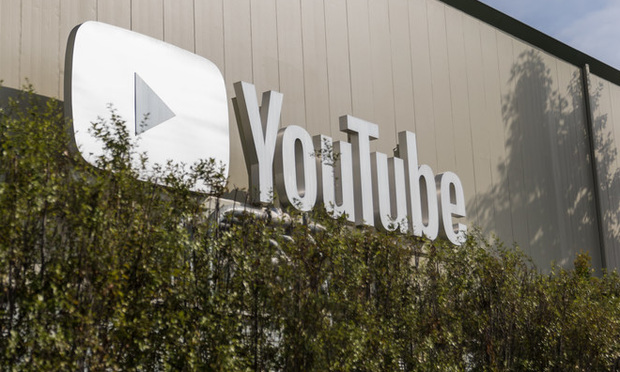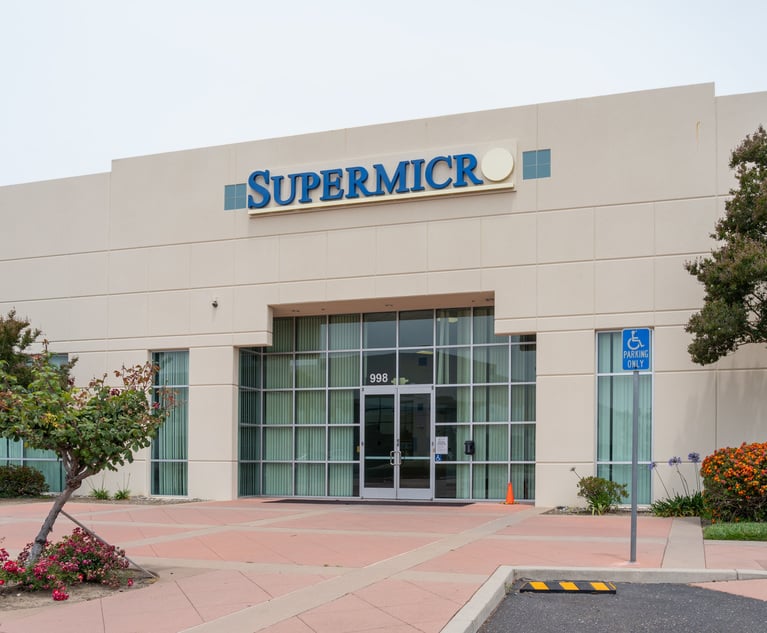Appellate Panel Ponders How the First Amendment Applies to YouTube
A nonprofit video producer founded by political commentator Dennis Prager argued that a Ninth Circuit panel should revive its claims that YouTube violated its First Amendment rights by restricting access to some of its videos.
August 27, 2019 at 03:56 PM
4 minute read
 YouTube Playa Vista. Photo: Jason Doiy/ALM
YouTube Playa Vista. Photo: Jason Doiy/ALM
A lawyer from Prager University, the nonprofit organization founded by political commentator Dennis Prager to produce videos with conservative analysis of history and topics of public debate, asked a federal appeals court Tuesday court to revive its First Amendment claims against Google.
Arguing for PragerU at the U.S. Court of Appeals for the Ninth Circuit, Peter Obstler of Browne George Ross said that Google's YouTube functions as a public forum and that the company's decision to restrict access to certain videos and strip others of potential advertising revenue amounts to state restrictions of PragerU's free speech rights.
Early in Tuesday's argument, Obstler compared YouTube to the "company town" in the U.S. Supreme Court decision in Marsh v. Alabama—a 1946 case where the court found that a state trespassing statute couldn't be invoked to block the distribution of religious materials on the sidewalk of a town privately owned by a company.
"They're not only a company town: They're arguably a company country and a company world-force," said Obstler, noting that YouTube controls as much as 95% of public video content and engagement on the internet.
But two members of the panel, Judges Jay Bybee and M. Margaret McKeown, sounded skeptical of PragerU's argument that YouTube's self-description as a forum for "free expression" had direct First Amendment implications. Bybee openly questioned if the court would have the responsibility to hold YouTube to the same standard as a state actor even if the company publicly declared that it would be bound by the First Amendment. "You want us to say that YouTube has been so successful that we are going to impute to it the role of a government," Bybee said later.
McKeown also questioned whether an internet service's declaration that it's a "pubic forum" means that it should be considered a public forum for the purposes of First Amendment analysis.
The lawsuit filed in 2017 claims that YouTube's decisions to restrict certain PragerU videos violate the First Amendment. The suit also claims that YouTube violates The Lanham Act, the federal false advertising law, by holding itself out as a forum for "freedom of expression" while making screening decisions based on criteria that aren't content-neutral. Browne George Ross and Obstler this month filed a separate suit against YouTube on behalf of LGBTQ video creators who claim they're being discriminated against by the site's moderators and algorithms.
The company's lawyers at Wilson Sonsini Goodrich & Rosati on Tuesday were asking the Ninth Circuit to uphold a ruling from U.S. District Judge Lucy Koh of the Northern District of California who found YouTube was not functioning as a state actor and that its representations about being a site for free expression amounted to puffery. Wilson Sonsini's Brian Willen said that using YouTube's own stated commitment to free expression to hold it liable under the First Amendment would have the "perverse" effect of causing internet companies to pull back from such commitments to avoid liability. "The First Amendment isn't a switch that gets turned on or off depending on how a business describes itself," he said.
He further argued that private companies can only be held to be fulfilling a pubic function for free speech purposes in situations that are "traditionally and exclusively" the function of the government. "There is absolutely no tradition of the government providing online services," Willen said.
But McKeown noted that YouTube's ubiquity in terms of internet-based videos put it in its own sort of category.
"Google has almost the equivalent of state power when it decides who can and cannot be hosted on that platform," she said.
This content has been archived. It is available through our partners, LexisNexis® and Bloomberg Law.
To view this content, please continue to their sites.
Not a Lexis Subscriber?
Subscribe Now
Not a Bloomberg Law Subscriber?
Subscribe Now
NOT FOR REPRINT
© 2025 ALM Global, LLC, All Rights Reserved. Request academic re-use from www.copyright.com. All other uses, submit a request to [email protected]. For more information visit Asset & Logo Licensing.
You Might Like
View All

Zoom Faces Intellectual Property Suit Over AI-Based Augmented Video Conferencing
3 minute read
'A Warning Shot to Board Rooms': DOJ Decision to Fight $14B Tech Merger May Be Bad Omen for Industry

California Walnut Grower and German Investment Firm Vie for Lead Plaintiff Status in Super Micro Securities Action
Trending Stories
- 1Public Notices/Calendars
- 2Wednesday Newspaper
- 3Decision of the Day: Qui Tam Relators Do Not Plausibly Claim Firm Avoided Tax Obligations Through Visa Applications, Circuit Finds
- 4Judicial Ethics Opinion 24-116
- 5Big Law Firms Sheppard Mullin, Morgan Lewis and Baker Botts Add Partners in Houston
Who Got The Work
J. Brugh Lower of Gibbons has entered an appearance for industrial equipment supplier Devco Corporation in a pending trademark infringement lawsuit. The suit, accusing the defendant of selling knock-off Graco products, was filed Dec. 18 in New Jersey District Court by Rivkin Radler on behalf of Graco Inc. and Graco Minnesota. The case, assigned to U.S. District Judge Zahid N. Quraishi, is 3:24-cv-11294, Graco Inc. et al v. Devco Corporation.
Who Got The Work
Rebecca Maller-Stein and Kent A. Yalowitz of Arnold & Porter Kaye Scholer have entered their appearances for Hanaco Venture Capital and its executives, Lior Prosor and David Frankel, in a pending securities lawsuit. The action, filed on Dec. 24 in New York Southern District Court by Zell, Aron & Co. on behalf of Goldeneye Advisors, accuses the defendants of negligently and fraudulently managing the plaintiff's $1 million investment. The case, assigned to U.S. District Judge Vernon S. Broderick, is 1:24-cv-09918, Goldeneye Advisors, LLC v. Hanaco Venture Capital, Ltd. et al.
Who Got The Work
Attorneys from A&O Shearman has stepped in as defense counsel for Toronto-Dominion Bank and other defendants in a pending securities class action. The suit, filed Dec. 11 in New York Southern District Court by Bleichmar Fonti & Auld, accuses the defendants of concealing the bank's 'pervasive' deficiencies in regards to its compliance with the Bank Secrecy Act and the quality of its anti-money laundering controls. The case, assigned to U.S. District Judge Arun Subramanian, is 1:24-cv-09445, Gonzalez v. The Toronto-Dominion Bank et al.
Who Got The Work
Crown Castle International, a Pennsylvania company providing shared communications infrastructure, has turned to Luke D. Wolf of Gordon Rees Scully Mansukhani to fend off a pending breach-of-contract lawsuit. The court action, filed Nov. 25 in Michigan Eastern District Court by Hooper Hathaway PC on behalf of The Town Residences LLC, accuses Crown Castle of failing to transfer approximately $30,000 in utility payments from T-Mobile in breach of a roof-top lease and assignment agreement. The case, assigned to U.S. District Judge Susan K. Declercq, is 2:24-cv-13131, The Town Residences LLC v. T-Mobile US, Inc. et al.
Who Got The Work
Wilfred P. Coronato and Daniel M. Schwartz of McCarter & English have stepped in as defense counsel to Electrolux Home Products Inc. in a pending product liability lawsuit. The court action, filed Nov. 26 in New York Eastern District Court by Poulos Lopiccolo PC and Nagel Rice LLP on behalf of David Stern, alleges that the defendant's refrigerators’ drawers and shelving repeatedly break and fall apart within months after purchase. The case, assigned to U.S. District Judge Joan M. Azrack, is 2:24-cv-08204, Stern v. Electrolux Home Products, Inc.
Featured Firms
Law Offices of Gary Martin Hays & Associates, P.C.
(470) 294-1674
Law Offices of Mark E. Salomone
(857) 444-6468
Smith & Hassler
(713) 739-1250






